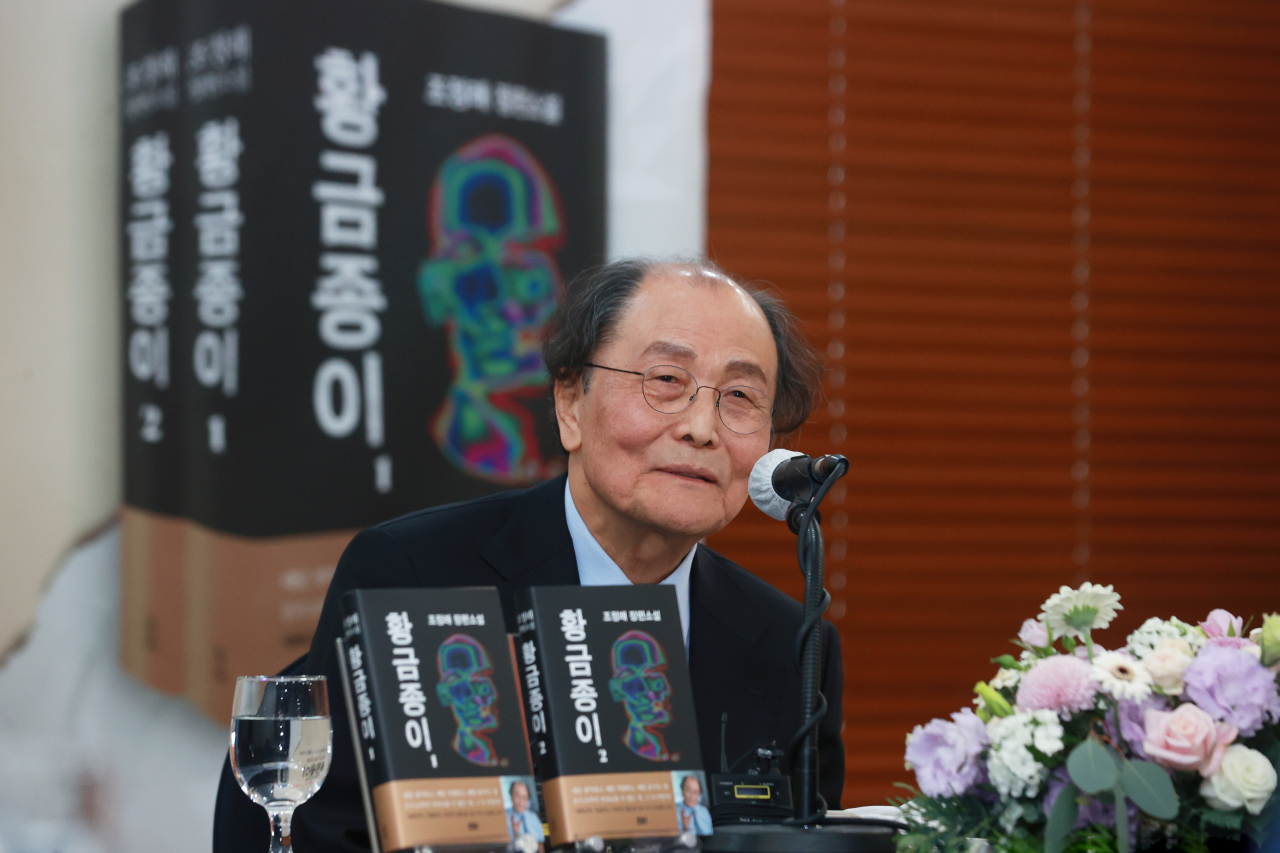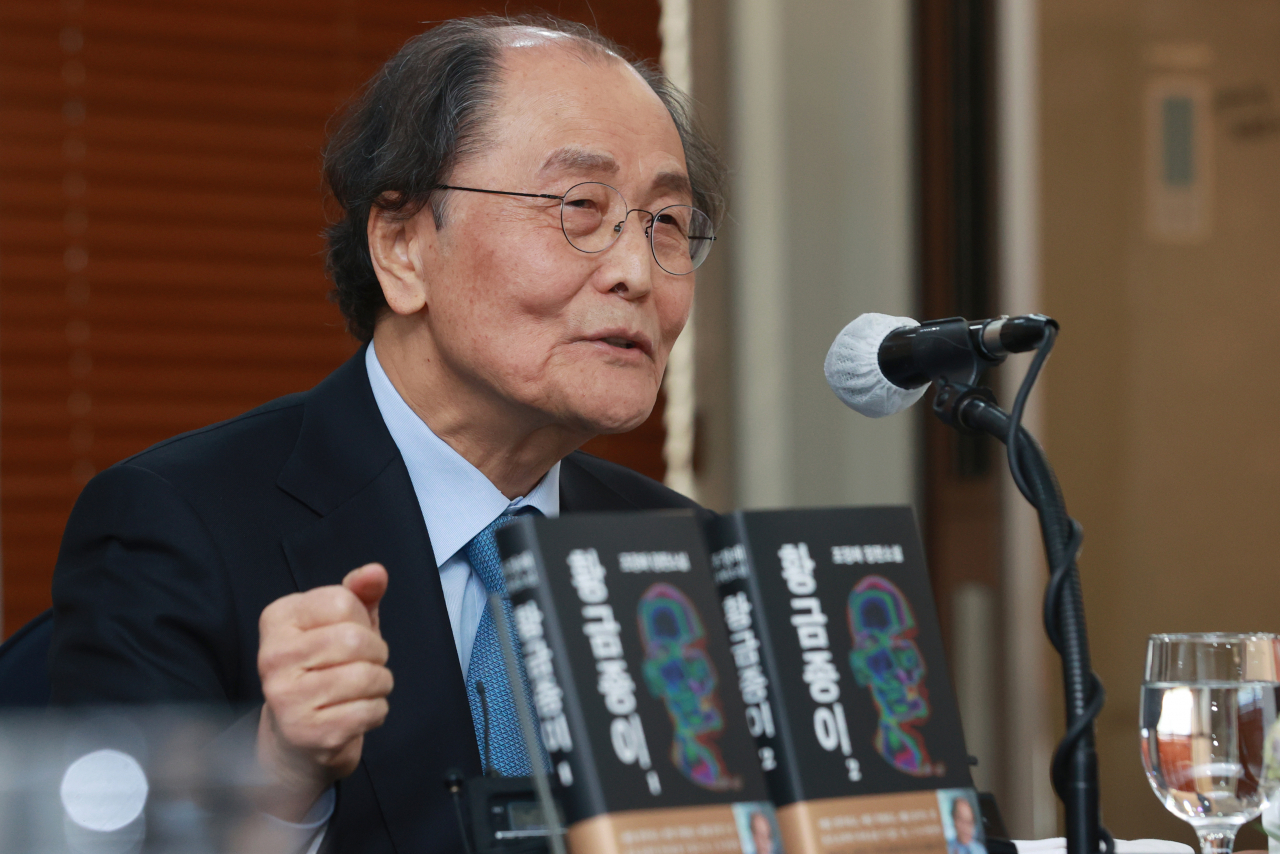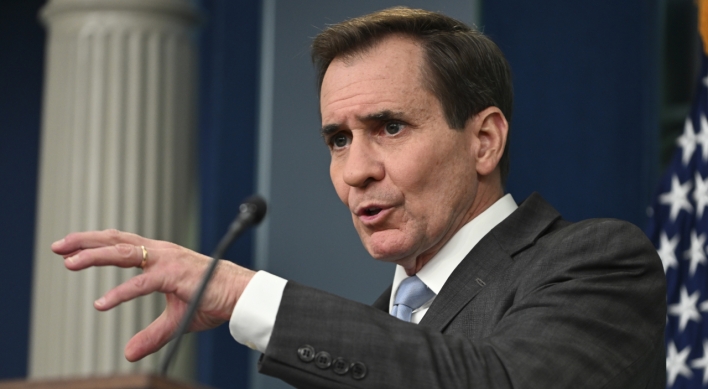S. Korean literary giant Jo Jung-rae embarks on final chapter of his journey as writer
By Hwang Dong-heePublished : Nov. 21, 2023 - 15:47

South Korean literary giant Jo Jung-rae said his latest novel, “Golden Paper,” marks the beginning of the ultimate chapter in his literary journey.
Reflecting on his extensive career since his debut in 1970, Jo categorized his years so far into two phases: The initial phase of short stories and novellas and the second phase which he dedicated to exploring the country's turbulent history through a number of epics -- “Taebaek Mountain Range,” “Arirang” and “Han River.” These works, recognized as a trilogy chronicling the entirety of modern Korean history, have become classics since their publication in the 1980s.
“Moving away from these earlier phases, I am now entering the third (and concluding) phase during which I will delve into human existence and desires,” said Jo during a press conference held in Jung-gu, central Seoul, Monday.
At the heart of his latest work is the theme of "money," a subject Jo has contemplated since his days as a struggling college student. The title, “Golden Paper,” serves as a metaphor for money, said Jo.
"I believe the desire for wealth is the key to revealing the true nature of humans. … Capitalism has become the ruling ideology; money wields increasingly greater influence and asserts its beastly power over us. I wanted to write a story about how money binds and dominates humans, and why humans are so obsessed with it," Jo said.
The story follows Lee Tae-ha, a once-promising prosecutor-turned-lawyer. The novel unfolds in an omnibus format, telling the stories of clients desperate for money seeking out Lee. The episodes portrayed in the novel are not much different from the heartless incidents in news headlines -- familial disputes over inheritance, conflicts between landlords and tenants, and destructive gambling addiction.
Jo noted that he posed two questions -- one in the author's note and the other through the title of the final chapter -- and the answer to both is "money."
According to Jo, "No one is free from money. But when desire grows and turns into greed, humans face disintegration."
“Religion, too, has failed (in solving this issue). I doubt how effective it would be to write a book on this subject. But I could not let it go for fear of failure.”

At the same time, Jo stressed the importance of “consistency,” that is, to be unwavering.
“To disintegrate may be life’s universal reality. (But) as a writer, I endeavored to uphold my initial mindset and have carried that perspective with me throughout my life,” he said. “I quit drinking while working on ‘Taebaek Mountain Range’ and haven’t touched alcohol for two decades. I have no regrets about my life as a writer because I have lived with such intensity.”
Having reached the 50-year mark since his literary debut, the 80-year-old writer said he felt grateful that "his mind remains clear despite the aging of his body," and that he is now preparing for his final days as a writer.
“My next project will draw inspiration from a Buddhist worldview and deal with the complexities of our soul and the afterlife,” he said, adding his intention to wrap up his literary journey with that endeavor. He aims to complete his final work within the next six years.
“I have two wishes at the moment,” he said. “One is to celebrate the 60th anniversary of my wedding with my wife (poet Kim Cho-hye) in good health, and the other is to commemorate the 60th anniversary of my literary debut with my final novel.”
"Even if I were born again, I would choose to be a writer because I have work to do. I understand that even writing for 60 years won’t bring about the world I desire. Nevertheless, a writer is someone who dies trying."





![[Music in drama] Rekindle a love that slipped through your fingers](http://res.heraldm.com/phpwas/restmb_idxmake.php?idx=644&simg=/content/image/2024/05/01/20240501050484_0.jpg&u=20240501151646)



![[New faces of Assembly] Architect behind ‘audacious initiative’ believes in denuclearized North Korea](http://res.heraldm.com/phpwas/restmb_idxmake.php?idx=644&simg=/content/image/2024/05/01/20240501050627_0.jpg&u=20240502093000)









![[Today’s K-pop] Stray Kids go gold in US with ‘Maniac’](http://res.heraldm.com/phpwas/restmb_idxmake.php?idx=642&simg=/content/image/2024/05/02/20240502050771_0.jpg&u=)